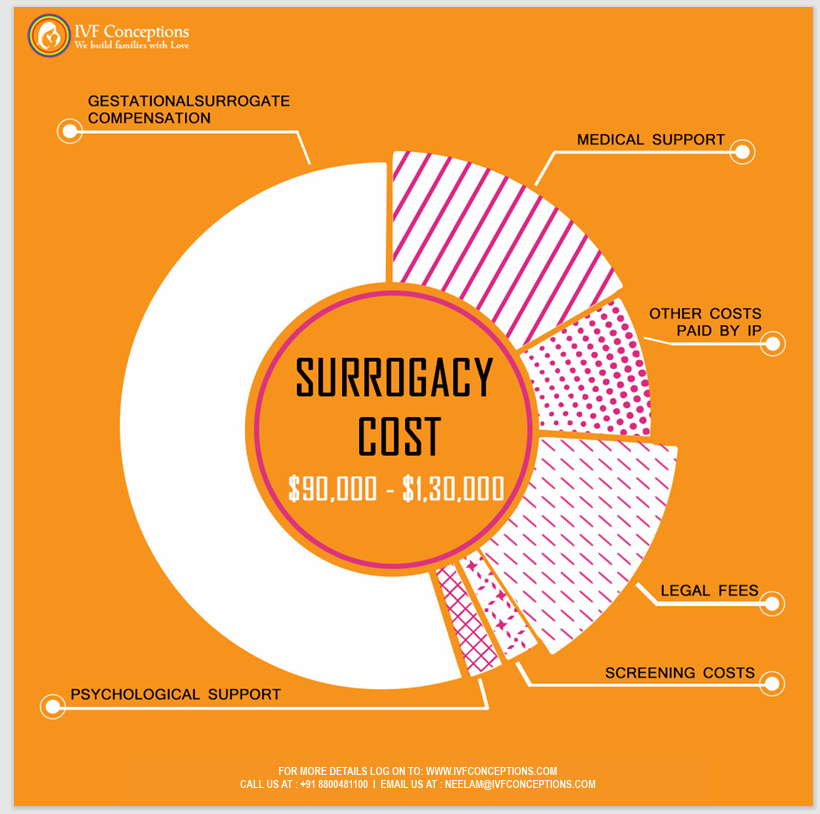How much does gestational surrogacy cost?

How much does gestational surrogacy cost | Average cost of surrogacy| Surrogate Mother cost
How much does gestational surrogacy cost? The typical cost ranges between $90,000 to $150,000+, depending on the services required and the surrogacy location.
In this comprehensive guide to surrogacy expenses, we will explore the breakdown of surrogacy fees, including agency fees, surrogate compensation, legal costs, and medical expenses. Understanding the total cost of gestational surrogacy will help intended parents plan their financial journey and make informed decisions about the best options for them.
- Book an online appointment: Get a free online consultation.
- Call\W:+91-8800481100 Email:neelam@ivfconceptions.com
Gestational surrogacy is a process where a woman carries a baby for another couple or individual. It’s a beacon of hope for those dreaming of becoming parents when traditional methods aren’t viable. However, as with any significant life choice, understanding the financial aspects is crucial.
More Resources to Read:
Infertility Treatment and Surrogacy Process
9 Factors To Improve IVF Pregnancy Rate
International Surrogacy Options Worldwide
Surrogacy Guide for Surrogate Mothers
Gestational surrogacy costs can be a financial commitment, but it’s crucial to understand the expenses involved. Here’s a breakdown:
1. Surrogate Compensation: Surrogate mothers receive compensation for their time and effort. This can range from $30,000 to $50,000 or more.
2. Medical Expenses: Covering the surrogate’s medical bills, including prenatal care, delivery, and any associated costs, can add up to $25,000 to $40,000.
3. Legal Fees: Legal contracts and arrangements can cost around $10,000 to $15,000.
4. Agency Fees: If you work with a surrogacy agency, expect fees in the range of $15,000 to $30,000.
5. IVF Costs: In vitro fertilization (IVF) expenses, including egg retrieval and embryo transfer, can vary but generally start at $10,000.
6. Screening and Counseling: Surrogate and intended parent psychological evaluations, medical screenings, and counseling may total $5,000 to $7,000.
7. Insurance: Ensuring the surrogate has appropriate medical insurance can range from $10,000 to $15,000.
8. Miscellaneous Costs: Additional expenses, such as travel, can add another $5,000 to $10,000.
Key Takeaway for surrogacy price in the USA:
| How much does a surrogate cost | Surrogate Cost Range |
| Surrogate Compensation | $30,000 – $50,000 |
| Medical Expenses | $25,000 – $40,000 |
| Legal Fees | $10,000 – $15,000 |
| Agency Fees | $15,000 – $30,000 |
| IVF Costs | Starting at $10,000 |
| Screening & Counseling | $5,000 – $7,000 |
| Insurance | $10,000 – $15,000 |
| Miscellaneous | $5,000 – $10,000 |

Why Understanding Costs is Crucial
Now, let’s talk about the elephant in the room: the financial aspect. Embarking on a gestational surrogacy journey is a profound commitment, one that involves both emotional and financial investment. Understanding the costs associated with this process is paramount for several reasons:
- Financial Preparedness: Knowing the potential expenses allows intended parents to plan and budget effectively. This ensures a smoother journey without financial surprises along the way.
- Transparent Decision-Making: By comprehending the costs upfront, intended parents can make informed decisions about whether gestational surrogacy aligns with their resources and goals.
- Legal and Ethical Responsibility: It’s essential to navigate the financial landscape ethically and legally. Transparent financial arrangements protect the interests of all parties involved, from the surrogate to the intended parents.
In the following sections, we’ll explore the various components that contribute to the overall gestational surrogacy cost. From surrogate compensation to legal fees and medical expenses, we’ll break down each aspect to provide you with a comprehensive understanding of the financial journey ahead.
So, whether you’re an intended parent considering gestational surrogacy or simply curious about the process, join us on this enlightening path as we unravel the intricacies of gestational surrogacy price.

How Much Does Gestational Surrogacy Cost?
Let’s explore what the gestational Surrogacy Cost Breakdown looks like:
I. Surrogate Mother Cost/Compensation:
The cost of a surrogate mother varies based on the surrogacy country. When it comes to gestational surrogacy, surrogate compensation is a critical aspect that requires careful consideration. It’s a reflection of the immense sacrifice and generosity of the surrogate mother. In this section, we’ll explore the factors influencing surrogate compensation and the typical range of surrogate fees.
Factors Influencing Surrogate Compensation
How much do surrogates cost? Well, the surrogate compensation is not a one-size-fits-all figure. It varies based on several factors that highlight the unique circumstances of each surrogacy journey:
1. Location
The geographical location plays a significant role in determining surrogate compensation. Surrogate fees can vary substantially from one region to another due to differences in the cost of living and demand for surrogates.
2. Experience
Surrogate mother costs can vary based on if she is an experienced surrogate, often referred to as an “experienced carrier,” who may command higher compensation due to their familiarity with the process and proven track record of successful surrogacies.
3. Surrogacy Agency Involvement
Intended parents may choose to work with surrogacy agencies to facilitate the process. Agencies often set compensation guidelines for surrogates, influencing the final compensation package.
4. Medical Expenses
Compensation also accounts for medical expenses that surrogates may incur during the journey, such as prenatal care, maternity clothing, and any potential complications.
5. Legal Agreements
The terms outlined in the legal contract between the surrogate and the intended parents can impact compensation. Specific provisions may address additional compensation for certain situations.
Typical Range of Surrogate Fees
While surrogate compensation can vary significantly, here’s a general range to provide an idea of what to expect:
- Base Compensation: The base compensation typically starts at around $30,000 and can go up to $50,000 or more.
- Additional Expenses: In addition to the base compensation, intended parents are usually responsible for covering other expenses related to the surrogacy journey, such as medical bills, legal fees, and travel costs.
It’s important to note that surrogate compensation isn’t just about the monetary aspect. Surrogates embark on this journey out of a genuine desire to help others create families, and their compensation reflects both the financial and emotional aspects of their contribution.

II. Medical Expenses: Nurturing the Journey
The path of gestational surrogacy is not only an emotional and ethical endeavor but also a medical one. Understanding the medical expenses associated with this remarkable journey is essential. In this section, we’ll detail the various medical costs involved throughout the pregnancy and provide estimates for prenatal care, delivery, and related expenses. Let’s dive into how much does surrogate costs in the USA. The typical gestational carrier price is given below.
Medical Costs Throughout the Pregnancy
Gestational surrogacy involves comprehensive medical care to ensure the health and well-being of both the surrogate mother and the developing baby. Here’s a breakdown of the medical expenses incurred during the surrogacy journey:
1. Prenatal Care
Prenatal care is a crucial aspect of the gestational surrogacy process. It includes regular doctor’s visits, ultrasounds, blood tests, and monitoring of the surrogate’s overall health. These expenses typically range from $5,000 to $8,000 or more, depending on the location and specific medical needs.
2. Delivery Expenses
The delivery of the baby is a significant medical event in the surrogacy journey. Costs associated with labor and delivery, including hospital fees, medical staff, and any necessary interventions, can vary widely. On average, expect to allocate between $10,000 to $15,000 for delivery expenses.
3. Maternity Clothing and Miscellaneous Medical Costs
Surrogate mothers may require maternity clothing and other miscellaneous medical expenses, such as over-the-counter medications or supplements. These costs can add up to a few thousand dollars.
4. Potential Complications
While rare, unexpected medical complications during pregnancy can lead to additional expenses. It’s essential to be financially prepared for such situations, and intended parents often set aside contingency funds for this purpose.
Planning for Medical Expenses
To navigate the medical aspects of gestational surrogacy, it’s crucial for intended parents to:
- Understand Insurance: Ensure that the surrogate has appropriate medical insurance that covers pregnancy-related expenses. This can help mitigate some of the medical costs.
- Budget Effectively: Factor in the estimated medical expenses into your overall surrogacy budget. Clear financial planning will prevent any surprises along the way.
- Legal Agreements: The legal contract between the surrogate and intended parents should outline how medical expenses will be handled, including who is responsible for payment.

III. Legal Fees and Agency Costs: Safeguarding the Journey
Surrogacy is a complex journey that involves multiple parties—surrogate mothers, intended parents, and sometimes, egg donors. A well-crafted legal contract is the cornerstone of ethical surrogacy. Here’s why it’s essential:
1. Clarifying Expectations
Legal contracts provide a framework for the surrogacy arrangement. They outline the rights, responsibilities, and expectations of all parties involved, ensuring that everyone is on the same page.
2. Protecting All Parties
Contracts protect the interests of both the surrogate and the intended parents. They address potential scenarios, such as medical complications or disagreements, and provide solutions in advance.
3. Ensuring Legal Parentage
Legal contracts also establish the intended parents as the legal parents of the child born through surrogacy. This is a critical step in the surrogacy process.
Fees Associated with Legal and Agency Services
Navigating the legal and logistical aspects of surrogacy often requires professional assistance. Here’s a breakdown of the fees associated with legal and agency services:
1. Legal Fees
- Legal Counsel: Intended parents and surrogates typically each have their legal counsel to represent their interests. Legal fees can vary but often range from $10,000 to $15,000 or more.
2. Surrogacy Agencies
- Matching Services: Surrogacy agencies provide a range of services, from matching intended parents with surrogates to offering guidance throughout the journey. Agency fees can vary significantly and often range from $15,000 to $30,000.
- Additional Services: Some agencies offer additional services, such as medical and psychological screenings, which can incur extra costs.
The fees associated with legal and best surrogacy agency services are investments in the integrity and success of the surrogacy journey. While they add to the overall cost, they provide invaluable peace of mind, ensuring that the process is conducted legally, ethically, and in the best interests of everyone involved.

IV. IVF Expenses
In the realm of gestational surrogacy, the IVF (in vitro fertilization) process is a pivotal bridge that connects intended parents with the possibility of biological parenthood. In this section, we’ll explore the IVF process, its associated costs, and how it contributes to the overall expenses of gestational surrogacy.
The IVF Process
1. Egg Retrieval: The IVF journey begins with egg retrieval, where eggs are harvested from the intended mother or an egg donor. This process involves hormonal stimulation, monitoring, and a minimally invasive procedure to retrieve the eggs.
2. Fertilization: The retrieved eggs are fertilized with sperm from the intended father or a sperm donor. The resulting embryos are carefully cultured in a lab.
3. Embryo Transfer: Once the embryos are ready, they are transferred into the uterus of the surrogate mother. This step is a key moment in the surrogacy journey.
Costs Associated with IVF
IVF is a crucial component of the gestational surrogacy process and comes with its own set of expenses:
- IVF Procedure: The cost of the IVF procedure itself can vary but typically starts at around $10,000. This cost includes egg retrieval, fertilization, and embryo transfer.
- Medications: Hormonal medications to stimulate egg production and support the IVF process can add several thousand dollars to the expenses.
- Additional Procedures: In some cases, additional IVF procedures, such as preimplantation genetic testing (PGT) or intracytoplasmic sperm injection (ICSI), may be required, incurring extra costs.
Contribution to Overall Expenses
IVF is a significant contributor to the overall expenses of gestational surrogacy. It’s important to remember that while IVF is a separate procedure, its costs are intimately tied to the surrogacy journey. The success of IVF is essential for the surrogacy process to progress, making it an indispensable part of the financial landscape.
Intended parents should factor in the costs of IVF when planning their surrogacy budget. Clear financial planning and understanding of these expenses will help ensure a seamless and successful surrogacy journey.

V. Screening and Counseling:
In the world of gestational surrogacy, the well-being of both the surrogate mother and the intended parents is of paramount importance. This involves thorough psychological evaluations and medical screenings. In this section, we’ll discuss the necessity of these evaluations and screenings and explain the costs involved in ensuring compatibility and health throughout the surrogacy journey.
The Necessity of Psychological Evaluations
1. Emotional Preparedness: Psychological evaluations are essential to assess the emotional readiness of both the surrogate mother and the intended parents. This helps ensure that all parties are prepared for the emotional complexities that can arise during the surrogacy journey.
2. Conflict Resolution: These evaluations can also identify potential areas of conflict or misunderstanding and provide tools to address them proactively. Open communication and understanding are key to a successful surrogacy partnership.
Medical Screenings for Health and Compatibility
1. Health Assessments: Medical screenings are conducted to assess the overall health and well-being of the surrogate mother. These screenings help ensure that the surrogate is physically capable of carrying a pregnancy to term.
2. Genetic Compatibility: In some cases, genetic compatibility between the intended parents and the surrogate may be assessed to minimize potential health risks to the baby.
Costs Involved in Screening and Counseling
While the well-being of all parties involved is priceless, there are costs associated with these evaluations:
- Psychological Evaluations: The cost of psychological evaluations can range from $1,000 to $2,500 per evaluation. Both the surrogate mother and intended parents may undergo separate evaluations.
- Medical Screenings: Medical screenings can cost between $2,000 to $4,000 or more, depending on the extent of testing and any additional screenings required.
It’s important to view these expenses not just as costs but as investments in the success and harmony of the surrogacy journey. They help ensure that both the surrogate and the intended parents are well-prepared, physically capable, and emotionally ready for the transformative experience of gestational surrogacy.

VI. Insurance: Safeguarding the Surrogacy Journey
In the intricate dance of gestational surrogacy, insurance coverage serves as a vital safety net, protecting both the surrogate mother and the intended parents. In this section, we’ll highlight the significance of insurance coverage for surrogates and provide cost estimates for securing the necessary coverage.
The Significance of Insurance Coverage for Surrogates
Insurance coverage is a critical component of the gestational surrogacy journey, offering protection and peace of mind to all parties involved:
1. Medical Expenses: Surrogate mothers may require medical insurance coverage to address any pregnancy-related expenses, including prenatal care, labor and delivery, and potential complications. Without adequate insurance, these costs could become a significant financial burden.
2. Legal Protection: Insurance can also provide legal protection by ensuring that the surrogate is covered in the event of any medical issues or disputes that may arise during the surrogacy journey.
Cost Estimates for Insurance Coverage
The cost of securing insurance for the surrogate can vary based on several factors, including the surrogate’s existing insurance coverage and the specific surrogacy arrangement. Here are some cost estimates to consider:
- Existing Insurance: If the surrogate has existing insurance that covers surrogacy-related expenses, the cost may be minimal. However, there could still be deductibles, copayments, or out-of-pocket expenses.
- Additional Insurance: In cases where the surrogate’s existing insurance does not cover surrogacy, the intended parents may need to purchase a separate insurance policy for her. The cost for such policies can range from $10,000 to $15,000 or more, depending on the coverage.
- Legal Fees: Legal fees may also be incurred to ensure that the insurance policy aligns with the surrogacy arrangement and adequately covers all parties involved.
Understanding the insurance landscape and ensuring that the surrogate has the necessary coverage is crucial for a smooth and secure surrogacy journey. It provides financial protection and peace of mind, allowing all parties to focus on the emotional and transformative aspects of the experience.

VII. Miscellaneous Surrogacy Expense
In the intricate mosaic of gestational surrogacy, there are various other expenses beyond the core components we’ve explored. These miscellaneous costs, though often unpredictable, are essential to consider in the surrogacy journey. In this section, we’ll enumerate potential expenses and explain their relevance to the overall budget.
Potential Miscellaneous Expenses
The gestational surrogacy journey can bring forth a range of additional costs, including:
1. Travel Expenses
- Surrogate Visits: If the surrogate lives in a different location, intended parents may need to cover travel expenses for visits during the pregnancy. This includes transportation, accommodations, and meals.
- Medical Procedures: Depending on the surrogacy arrangement, intended parents may need to travel for medical procedures, such as embryo transfer. These travel costs should be factored into the budget.
2. Complications and Unforeseen Expenses
- Medical Complications: While rare, unexpected medical complications during pregnancy can lead to additional medical expenses. A contingency fund can help cover these costs.
- Legal Contingencies: In some cases, legal issues may arise that require additional legal support or fees.
3. Contingency Funds
- Peace of Mind: It’s advisable to set aside contingency funds in the budget to cover unforeseen expenses. This ensures that financial surprises do not derail the surrogacy journey.
Relevance in the Overall Budget
These miscellaneous expenses, though unpredictable, are essential to consider for several reasons:
- Budget Preparedness: Anticipating these potential costs and allocating funds accordingly allows intended parents to be financially prepared for any scenario that may arise.
- Minimizing Stress: Having a financial cushion in the form of contingency funds reduces the stress associated with unexpected expenses, allowing the focus to remain on the well-being of all parties involved.
- Ensuring a Smooth Journey: By accounting for these miscellaneous costs, intended parents can ensure that the surrogacy journey proceeds seamlessly without financial hindrances.
The Importance of Financial Planning and How Much Surrogacy Costs in the USA
How much does it costs to have a surrogate depends on many types of surrogacy and the location of surrogacy:
Navigating the gestational surrogacy journey demands a keen understanding of the financial landscape. The significance of financial planning cannot be overstated:
- Clarity and Preparedness: A well-planned budget ensures that intended parents are clear about the costs involved and financially prepared for the journey ahead.
- Security and Peace of Mind: Adequate financial planning provides a safety net, offering peace of mind in the face of unexpected expenses or complications.
- Ethical and Legal Integrity: Transparent financial arrangements, including compensation, legal fees, and insurance, uphold the ethical and legal integrity of the surrogacy journey.
International surrogacy costs worldwide
Pursuing international surrogacy often costs significantly less than domestic routes in Western nations. In popular overseas surrogacy destinations like Ukraine, Mexico, Georgia, Colombia, and Argentina intended parents can expect total expenses ranging from $30,000-$65,000 on average.
Lower medical fees, surrogate compensation rates, and favorable laws abroad drive down overall international surrogacy costs. However, added travel expenses plus legal complexities still make this a major investment for intended parents. Working with specialized international surrogacy agencies streamlines logistics from medical coordination to citizenship paperwork across borders. Understanding both financial costs and process intricacies allows those exploring overseas surrogacy to make informed decisions
Cheapest countries for surrogacy:
| Country | Regulation & Organization | Who are allowed to participate | Surrogacy Cost | Legal Assurance |
| Colombia | Altruistic | Singles, gay couples, hetero couples | Affordable $70,000 | Reliable |
| Mexico | Altruistic | Singles, gay couples, hetero couples | Affordable $70,000 to $80,000 | Reliable |
| USA | Commercial | Singles, gay couples, hetero couples | Costly $150,000+ | Strong |
| Ukraine | Commercial | Hetero couples | Affordable $60,000 | Strong |
| Georgia | Commercial | Hetero couples | Affordable $60,000 | Strong |
| Greece | Altruistic | Hetero couples and single women | Affordable $80,000 | Strong |
Additional guide for intended parents:
Best surrogacy agency in India
Best surrogacy agency in Mexico
Best surrogacy agency in Colombia
Best surrogacy agency in Argentina
Best surrogacy agency in Georgia
Best surrogacy agency in the USA
Best surrogacy agency in Ukraine
Best surrogacy agency in Armenia
Conclusion
How much does surrogacy cost, the answers vary and each surrogacy journey has its own cost based on the country where surrogacy is carried out and what services are used.
Navigating the intricate world of gestational surrogacy pricing and cost planning requires expertise and guidance. Gestational surrogacy agencies, surrogacy cost experts, insurance providers, and tax consultants can provide invaluable assistance in understanding the surrogacy cost breakdown and the tax implications of gestational surrogacy.
Financial planners are essential partners in creating a solid surrogacy budget, offering surrogacy budgeting tips tailored to your unique situation.
For those seeking low-cost gestational surrogacy options, there are surrogacy financing organizations that specialize in providing financial aid for surrogacy and it is possible to consider affordable international surrogacy countries.
When it comes to surrogacy expenses by state, remember that costs can vary significantly depending on where you live. A surrogacy cost comparison by state can help you make informed decisions about the location of your surrogacy journey.
In conclusion, gestational surrogacy cost is a multifaceted topic that requires careful consideration and planning.
Consulting with the right experts and organizations can make this transformative journey more accessible and financially manageable, bringing the dream of parenthood within reach for many.
If you’d like to learn more about IVF, Egg Donation, or surrogacy services globally, check out the rest of our website at Complete Surrogacy Agency. We offer legally secure and affordable surrogacy consulting services for FREE.
For more resources on IVF and Surrogacy, browse our other web page- IVF Conceptions.
For more resources on IVF and Surrogacy, browse our other web page- Georgia Surrogacy Agency.
Complete Surrogacy: Your Trusted Partner in International Surrogacy
At Complete Surrogacy, we have over 15 years of experience in international surrogacy, guiding 4,000+ intended parents worldwide. We provide safe, ethical, and affordable surrogacy solutions for single parents, LGBTQ+ couples, and heterosexual couples.
As members of EFS and ESHRE, we adhere to the highest ethical and professional standards. Our expert team is committed to providing accurate, compassionate, and transparent guidance, ensuring a legally secure and smooth journey to parenthood.
Let us help you build your family with trust, care, and integrity.
Get in touch for one FREE Surrogacy Consultancy!
Our team includes experts from diverse backgrounds with leading reproductive attorneys, professionally trained top fertility doctors, former surrogacy case managers, experienced and kind surrogate mother and egg donor coordinators, mental health professionals specializing in infertility counseling, and a logistic support team to assist you in your chosen surrogacy country.
Frequently Asked Questions About What Does Surrogacy Cost?
1. How much does surrogacy cost?
The cost of surrogacy can vary depending on various factors such as the location, agency fees, medical costs, and surrogate compensation. On average, the total cost of surrogacy can range from $90,000 to $150,000.
2. What is the cost of a surrogacy journey?
The cost of surrogacy includes agency fees, fertility clinic expenses, legal fees, medical procedures, and surrogate compensation. The average cost of surrogacy can be between $90,000 and $150,000.
3. How much does a surrogate mother cost?
The cost of a surrogate mother can vary, but on average, the compensation for a surrogate can be around $30,000 to $40,000.
4. What are the average costs involved in surrogacy?
The average costs of surrogacy include agency fees, legal fees, medical expenses, fertility clinic costs, surrogate compensation, and health insurance. These costs can vary, but on average, they can range from $90,000 to $150,000.
5. How much does a surrogacy program cost?
A surrogacy program can cost between $90,000 and $150,000. This includes various expenses such as agency fees, medical costs, legal fees, and surrogate compensation.
6. What is the overall cost of surrogacy with a surrogacy agency?
The overall cost of surrogacy can be between $90,000 and $150,000, including agency fees, legal fees, medical expenses, fertility clinic costs, surrogate compensation, and other related expenses.
7. How does insurance for the surrogate impact the cost of surrogacy?
Insurance for the surrogate can impact the cost of surrogacy. If the surrogate already has comprehensive medical insurance that covers the surrogacy journey, it can reduce the overall medical costs. However, if additional insurance is required, it can increase the overall cost.
8. Does surrogacy in the United States have a higher cost?
Surrogacy in the United States can have a higher cost compared to other countries. The higher cost can be attributed to factors such as legal requirements, medical expenses, and higher compensation for surrogates.
9. Are medical costs included in the overall cost of surrogacy?
Yes, medical costs are included in the overall cost of surrogacy. However, you need to confirm with your surrogacy agency about the breakdown of surrogacy costs and any incidental surrogacy costs to avoid surprises later on.
10. What is surrogacy cost with a friend?
The cost of surrogacy with a friend will always be less as you do not need to pay surrogate compensation, which can be a significant cost if you are doing surrogacy in the USA. So, you can expect to save up to $30,000 to $45,000, if you have your own altruistic surrogacy process.
11. Will insurance cover surrogacy costs?
In most cases, no – insurance will not cover surrogacy costs. Health insurance policies view surrogacy as an elective procedure, similar to plastic surgery, and exclude coverage.
A few exceptions exist in states with surrogacy-friendly laws that mandate coverage for infertility treatments. But overall intended parents can expect to pay most medical and non-medical expenses out of pocket when working with a gestational carrier. Researching surrogate insurance policies and factoring in this major uncovered cost is essential in the planning process when pursuing surrogacy.
References:
1. American Pregnancy Association – Surrogacy Financing
2. National Conference of State Legislatures – Surrogacy Laws and Regulation

Author Bio: Neelam Chhagani is an International Surrogacy Expert with 15 years of experience in the fertility and surrogacy domain. As the founder of IVF Conceptions and Complete Surrogacy, she has guided over 4,000 intended parents worldwide on their surrogacy journey to parenthood. Recognized as a trusted authority, she specializes in holistic infertility solutions and third-party reproduction consulting.
Holding an MA in Counselling Psychology and a PGD in Mental Health, Neelam is a proud member of the European Fertility Society (EFS) and the European Society of Human Reproduction and Embryology (ESHRE). She is also a leading surrogacy blogger, providing valuable insights into ethical and practical surrogacy solutions.
Since 2010, committed to supporting ALL family types, Neelam has been passionate about helping intended parents grow their families with compassion, integrity, and a focus on secure and affordable surrogacy options Globally.
Learn more about Neelam:
https://www.ivfconceptions.com/neelam-chhagani-surrogacy-consultant/
https://www.linkedin.com/in/neelam-chhagani-92892229/















I was introduced to Neelam by a friend who worked with Neelam for surrogacy. Neelam is absolutely wonderful. I am a single male and the journey to fatherhood is not that easy. Neelam connected me to a program ideal for my circumstances. She was with me throughout the pregnancy providing advice and guidance along the way. I am so grateful I found her and am thrilled today that I have a beautiful daughter. I highly recommend Neelam to anyone who is on a journey to become a parent. Having a child has changed my world for the better. I wish others success with their own journey and recommend you connect with Neelam to find a path that is best for you.
SA (USA)